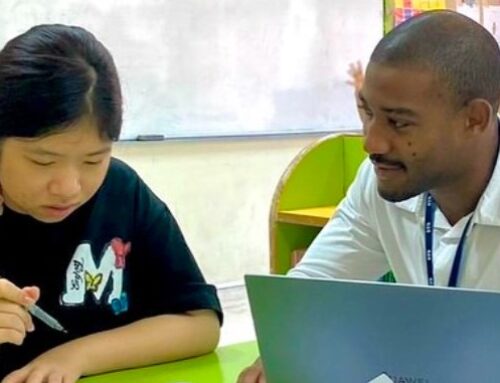By Josh Butterworth. Josh is Impact Teaching’s Thailand Program Coordinator, and he lives in Thailand.
Stepping into the classroom for the first time as a new teacher, in a new school, in a foreign land; can be a daunting. Students scurry through the corridors chirping in a language you cannot understand, pointing at you in awe as you stand awkwardly scanning the hallway for your classroom, overwhelmed and a little scared about what you’ve got yourself into.
But all of our teachers from Budapest to Beijing have experienced this feeling, and if you’re reading this, you might be about to as well. And, I have good news, it doesn’t last. The natural fear that arises in everyone when they start their teaching adventure is chipped away at day by day until it eventually disappears.
There are however a few things you can do to give yourself the best chance of a positive start at your new job, laying the foundations for future success. With the help of our awesome alumni, we have put together a list of five top tips to help build good relationships with your students, colleagues and yourself as you begin a truly amazing and lifechanging experience.
Perfect is the enemy of good
It’s completely normal to feel the pressure when starting any new job, but teaching small humans halfway across the world can generateeven more stress than usual. If you’re reading this and have chosen to teach abroad, then you are likely someone who wants to do your best and help others. Trust me when I say this, that is enough.
The local teachers at your school, your new colleagues, are not expecting perfection. I have witnessed in myself and other new teachers, an overwhelming sense of pressure develop, that does nothing but hinder performance. But that pressure always comes from within, remembering that will help you let go of it and be the best you can be.
Perfection is not expected and your always trying your best is good enough.
Happy colleagues = happy teacher
Learning the culture of a new workplace can be a complicated and confusing task, let alone when you are having to do so in an unfamiliarcountry that is not your own. Luckily, there are some characteristics which are universally appreciated in every school from Poznan to Phetchabun, and will get you very far if you implement them.
Punctuality, professionalism, a positive attitude and good old hard work will land you in the good books of all your new colleagues on day one. And that is exactly where you want to be. Having friends or good working relationships at the place you’ll spend most of your time will make your life so much easier in and out of school.
Win over your colleagues with hard work and professionalism.
Fake it until you make it
Your colleagues might not expect you to be a perfect teacher on day one, or ever for thatmatter, but your students may have other ideas. Fortunately, they are a lot easier to fool, and the way to do so is not complicated or difficult. Confidence and being assured will convince any class you are in absolute control, even if you have no idea what you’re doing.
Children are incredibly adept at reading body language, it’s a skill they develop at an early age. But the tools they use to do this are less sophisticated than adults, and they can be easily duped into thinking someone is feeling something they are not. A nervous, confused or frustrated teacher can be identified in a heartbeat. But one that is feigning confidence is usually accepted on face value.
Fake confidence trumps a nervous teacher every time.
Teacher first, friend later
Just as important as good relationships with your colleagues are positive relationships with your students. And I would not begrudge youfor thinking that the best way to achieve this is by becoming their friends, but it is not. It’s far easier to set boundaries and become an authority figure from day one, and becomes friends later, than it is the other way around.
By no means should you be a cold and strict authoritarian from the second you step into the classroom, but it is important to make it clear that you are a teacher who should be respected as one, and your job is to teach. Absolutely become friends and get to know your students throughout the year, but by starting strong are only putting yourself in a better position to do so.
Gaining authority from the start is a lot easier than later on.
Failing to prepare is preparing to fail
It’s hard to prepare for a job you’ve never done before, but it’s crucial you try to do just that. Lessons rarely go to plan and you’ll have tothink on your feet, you may have to teach when you thought classes were cancelled, or you might even have to step in for an absent teacher. Having games and activities to fall back on removes anxiety and will give you the confidence you need to perform.
And growing a bank of things to do in class can start even before you have stepped into a classroom. By attending our training sessions and the content we provide, speaking to ex-teachers and researching online, you will be ready for whatever is thrown your way. Of course you will also learn on the job, what works and what doesn’t, to help ensure you’re always ready.
Not being one step ahead is being one step behind.
Following these five steps won’t make you a perfect teacher, but they will give you the best possible start you can have. Teaching abroad is nothing to be afraid of, many have done it before and many will in the future. If that’s you, and you have read all of this, you’ll be great too!
Check out our programs in China, Thailand, Vietnam, Hungary and Poland to see where your next adventure could be.




